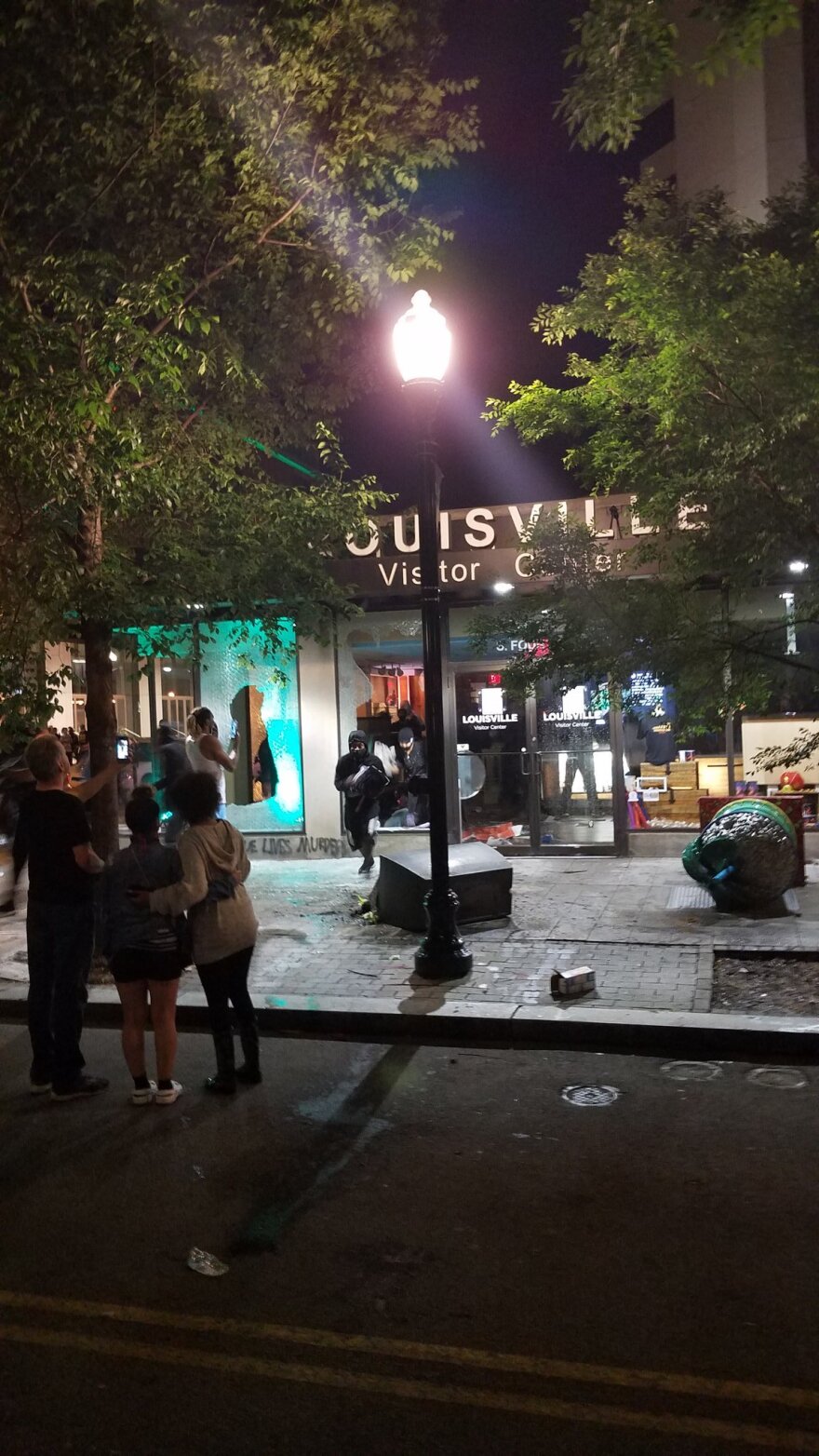In early June, as protests were erupting in Louisville, police said a group of twenty-somethings who robbed an athletic clothing store miles away from the downtown demonstrations in southern Jefferson County were looting.
All four accused of breaking into the City Gear store on Cane Run Road were charged with third degree burglary, because Kentucky doesn’t have any criminal statutes about “looting.” But looting is how the police described the crime.
Louisville is engulfed in protests and has been all summer long. In that time, Louisville Metro Police have arrested at least 46 people for burglary charges and deemed them to be connected to the protests, according to data provided by the Louisville Metro Police Department.
Nearly all of those arrests have occurred in neighborhoods that are far from protest sites — Lyndon, Portland, Chickasaw, and in the case of the City Gear store, St. Dennis. Yet still, police and city officials have tied these burglaries to the protests, oftentimes referring to the incidents as looting, a tactic experts describe as akin to a public relations campaign meant to spark vitriol against protesters and further a narrative that the city is engulfed in mayhem and the only protection is aggressive policing.
“This is all about legitimizing a story that’s being constructed and providing capacity to legitimize using excessive force against protesters,” said Dana R. Fisher, a professor of sociology at the University of Maryland. “And most people who protest are peaceful.”
In Louisville, protests have been ongoing since late May, when a flurry of demonstrations erupted in downtown Louisville for Breonna Taylor, a 26-year-old Black woman who was shot and killed by LMPD officers in March. The first week of protests was a whirlwind of civil unrest: at least seven people were shot just steps from Metro Hall, windows were broken throughout downtown and some stores were robbed. David McAtee, a 53-year-old Black restaurateur, was shot and killed by the National Guard at his west Louisville barbecue stand.
In six days, police tied 41 burglary arrests to the protests, according to LMPD data. Of those people, 38 are Black. Nine people arrested for burglary charges in relation to protests since May 30 are juveniles, according to police data.
The arrests generally came in clusters — four people arrested on May 31 after allegedly breaking-in to a Sprint store on Bardstown Road; four others on June 2 at the City Gear store, which is nearly eight miles from downtown Louisville; seven more were arrested in the early hours of June 3 at a Walgreens in Chickasaw; then two people were accused of “actively stealing” soap, toilet paper and tobacco products from a Family Dollar in Shawnee; six people were arrested in far eastern Louisville on June 4 after allegedly smashing into a jewelry store in Lyndon; three others were arrested in Portland for allegedly breaking into a CVS and now face federal charges after police say they found a gun in the suspect’s vehicle.
Some of those were near to protests, such as the Bardstown Road store. The June 3 events in west Louisville closely followed McAtee’s shooting death.
Police described the burglaries as looting in seven of the related arrest citations. Nearly all were charged with third-degree burglary, a Class D felony that carries a penalty of up to five years in prison.
In the weeks that followed, just two other people were charged with protest related burglary charges, as diminished crowds continue to protest daily in Jefferson Square downtown.
Police claims of looting also waned — until this week.
Renewed Protests Bring More LMPD Looting Examples
A grand jury that considered a case built by Kentucky Attorney General Daniel Cameron’s office announced charges on Wednesday for just one of the officers involved in the fatal raid that left Taylor dead. The charges were unrelated to Taylor’s death.
The next day, LMPD Chief Robert Schroeder claimed that sixteen instances of looting had occurred “outside of the downtown area.”
No arrests were made. When asked how the alleged looting related to the protests Shroeder said “we don’t know if they were protest related or not or if they were merely people taking advantage of the situation.”
Jessie Halladay, an LMPD spokesperson, said police have no evidence that it’s protesters who are doing the “looting.” Rather, she said police suspect people are taking advantage of the large police response to protests by burglarizing businesses elsewhere.
This shows the balancing act that police are tasked with during large scale civil unrest such as those that have occurred in Louisville, said Brian Higgins, an adjunct professor at John Jay College of Criminal Justice.
But connecting burglaries miles away to protests that are largely concentrated downtown requires more evidence from police, he said.
“They have to be able to have a nexus between the protests and the crime, they have to have a reason why they use that term,” he said.
Lt. Col. Josh Judah, in a press conference on June 4, tied the so-called looting directly to the protests. “What’s happening in our city after demonstrators disperse is violent, aggressive, destructive looting,” he said. “It’s unacceptable.”
It was three days after the National Guard shot and killed McAtee. The police chief had just been fired after it was revealed that the LMPD officers who also shot at McAtee hadn’t turned on their body cameras. Social media posts from one of those officers showed she was making light of firing pepper balls directly at protesters.
Judah played a four minute compilation video of Black people carrying items across streets and through grassy yards, of shattered glass and disheveled stores, and a police dog on a frantic search for a suspect through Jefferson Mall.
The video footage, he said, provided proof of the looting.


